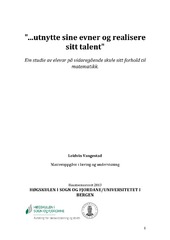| dc.contributor.author | Vangestad, Leidvin | |
| dc.date.accessioned | 2014-02-10T12:29:52Z | |
| dc.date.available | 2014-02-10T12:29:52Z | |
| dc.date.issued | 2013-11-15 | eng |
| dc.date.submitted | 2013-11-15 | eng |
| dc.identifier.uri | https://hdl.handle.net/1956/7776 | |
| dc.description.abstract | In Report No. 30 (2003-‐2004) Kultur for læring the Ministry of Education and Research suggests that schools should aim to " convey values and provide the knowledge and tools that make it possible for every individual to utilize their skills and realize their potential" (p. 3). Even if one assumes that a school has largely succeeded in achieving this goal, it is nevertheless apparent that not all pupils fully utilize their skills and talents in the school context. These perceptions are based on teacher’s experiences, but are also supported by national and international surveys. This report is based on a qualitative survey conducted on five pupils who are in their second year in high school. The backdrop used for the survey is Albert Bandura's social cognitive theory. Both social and cognitive aspects of pupils' relationship to the school are investigated. The report is concerned with how the pupils, who were at the start of their school carrier when the Report No. 30 was published, have experienced their education thus far. In particular, the study focuses on how they describe their relationship to mathematics, to what extent they are interested in and motivated by this discipline, how much effort they apply and how they perform in this field. Furthermore, the study investigates how they work with the subject and how much priority the subject is given. The results show that students experience the social side of school as very positive. They experience inclusivity and well-‐being. Motivation and interest varies between subjects, but is generally low. Only participants who take the most demanding mathematics courses gave positive feedback with respect to motivation and interest levels. The other participants displayed the potential to apply greater effort and achieve greater understanding of the subject. In the cases when potential is not realized the primary cause is boredom, not laziness or indifference. They have after all chosen secondary school because they want to take higher education. The participants have made conscious choices and prioritize time for friends and recreation. Finally the report outlines some suggestions for changes that could be made in order to improve the situation for those who are bored in school and may perhaps lead to improvements for the other students as well. | en_US |
| dc.description.abstract | I St.mld. nr. 30 (2003-2004) Kultur for læring uttrykte Utdannings- og forskningsdepartementet at skulen skulle ha som mål å "formidle verdier og gi kunnskap og redskaper som gjør det mulig for hver enkelt å utnytte sine evner og realisere sitt talent" (s. 3). Om ein legg til grunn at skulen stort sett har lukkast med å nå dette målet, kan det likevel sjå ut til at ikkje alle elevar utnyttar evnene og talenta sine i skulesamanheng. Oppfatninga er basert på lærarar si erfaring, men har også støtte i nasjonale og internasjonale undersøkingar. Denne rapporten er basert på ei kvalitativ undersøking gjort blant fem elevar som går andre året på vidaregåande skule. Bakteppet for undersøkinga er Albert Bandura sin sosial-kognitive teori, det vert difor sett både på sosiale og kognitive sider ved elevane sitt forhold til skulen. Den handlar om korleis elevar som var i starten av skulekarriera si når Kultur for læring vart skriven, har opplevd skulen, kva forhold dei har til den og korleis dei forklarer og grunngjev dette forholdet. Spesielt fokuserer undersøkinga på korleis dei beskriv og grunngjev forholdet til matematikk. I kva grad er dei interessert i og motivert for faget, kva innsats yter dei og korleis presterer dei. Vidare vert det også sett på korleis dei jobbar med faget og korleis dei prioriterer. Resultata viser at elevane opplever den sosiale sida ved skulen som svært positiv. Dei opplever tilhøyrigheit og trivsel. Motivasjon og interesse varierer med faga, men er generelt låg. Berre informanten som tek det mest krevjande matematikkurset utmerkar seg positivt på desse områda. Dei andre informantane har potensiale til å yte større innsats og meistre betre. Når dei ikkje gjer det, skuldast det først og fremst skuleleiheit, ikkje latskap eller likegyldigheit. Dei har tross alt valt vidaregåande skule fordi dei ønskjer å ta høgare utdanning. Informantane gjer bevisste val og prioriterer tid til venner og fritidsaktivitetar. Rapporten skisserer til slutt nokre forslag til endringar som kan gjerast for å betre situasjonen for dei skuleleie, kanskje også for dei andre elevane. | en_US |
| dc.format.extent | 612109 bytes | eng |
| dc.format.mimetype | application/pdf | eng |
| dc.language.iso | nno | eng |
| dc.publisher | The University of Bergen | eng |
| dc.title | "...utnytte sine evner og realisere sitt talent". Ein studie av elevar på vidaregående skule sitt forhold til matematikk | eng |
| dc.type | Master thesis | |
| dc.rights.holder | Copyright the author. All rights reserved | |
| dc.description.degree | Master i Læring og undervisning | |
| dc.description.localcode | UND350 | |
| dc.description.localcode | MAPS-UND | |
| dc.subject.nus | 729999 | eng |
| fs.subjectcode | UND350 | |
